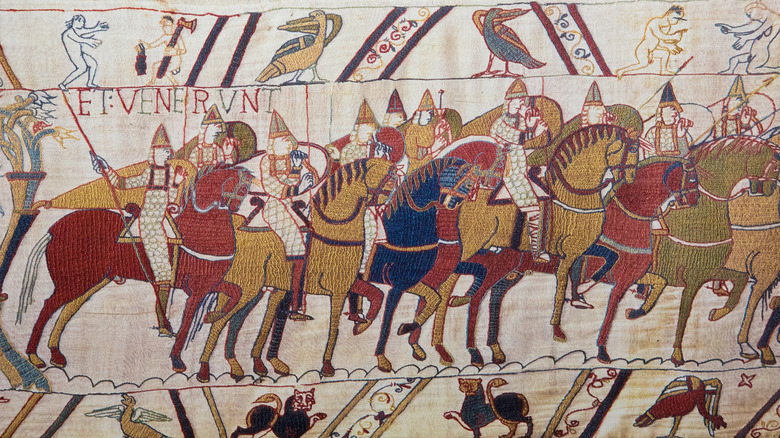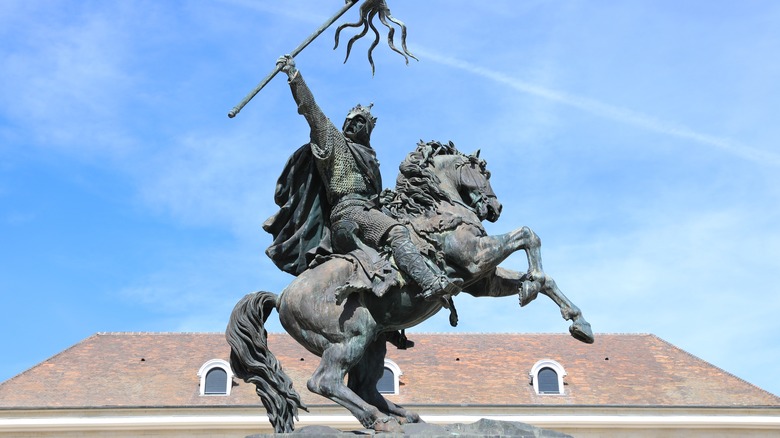Anglish: A Re-Imagined Version Of English That Removes All Foreign Influences
And so we tell a tale of makebelieve soothspel, one where English meel, staffcraft, and bookcraft are swith unalike ere they are now. Or put differently: And so we tell a tale of imaginary history, one where English speech, grammar, and literature, are very different than they are now.
That opening sentence is an example of Anglish, courtesy of the Anglish Wordbook (Anglish Dictionary). Some words may look couth (familiar), some words eldritch (strange). And even those couth words might carry a different meaning in English, like how couth means refined. But if English hadn't absorbed so many loanwords from French, Latin, and Greek — and instead stayed isolated from foreign influence on the little island of England — it's the language we might be speaking today. That is, pretending that any of us would be here alive, who we are, and where we are now.
Anglish is a reconstructed, or more accurately, reimagined, version of English stripped of all but indigenous Germanic words. It reverse engineers vocabulary and grammar from English's sister languages — Dutch, Frisian, German, and so on — to rebuild a language that sounds a bit archaic, magical, and like an ancient tribal warrior is growling through a mouth full of meat while sitting at a fire. Some linguists, historians, researchers, and interested lay people have taken it upon themselves to rebuild Anglish. And now we can neet the kern of their arveth — we can enjoy the fruits of their labor.
A strange, hybrid language
Folks might be wondering: Are there really so many "foreign" words in English — not foreign at this point, honestly — that removing them would make a big difference? Figures vary, but Canadian linguist Paul Jorgensen on his YouTube channel Langfocus sites only 26% of English words as indigenously English, i.e., Anglo-Saxon. More than double that — 58% — comes from French and Latin. And since French is a Latin language, the Latin words — 29% — come from Latin directly, not Latin by way of French. Another 6% comes from Greek and the rest from other languages. But bear in mind we're talking about total vocabulary, not words that are commonly or uncommonly used. Aberration, for instance (a fantastic word), comes from French but is not commonly used unless under specific conditions or in literature, per SEL Business Languages. Many ultra-common words like bad, good, boy, you, I, brother, sister, etc., remained wholly Germanic.
Just to show you that you're speaking French, Latin, and Greek every day without realizing it, here are some quick lists: French-derived foreign words? Language, article, victory, question, existence, evidence, famous, significant, flower, people, river, faith, stomach, change, park, toast, and many thousands more (per Wondrium and Etymonline). Greek-derived foreign words? Mathematics, physics, baptism, telephone, democracy, athletic, cemetery, dinosaur, galaxy, sarcasm, cynicism, and many thousands more (per Babbel and AtCorfu). Latin words include agenda, avarice, debilitate, futile, mundane, obvious, rapport, reprisal, succumb, tentative, and again, many thousands more (per ThoughtCo).
To William the Conqueror we thanksgive
Readers might be wondering at this point, "How did English get this way?" Those who know foreign languages, have taught languages, or spent time abroad can tell you how weird English is, especially its spelling (and let's be honest: an 8-year-old can do that last thing). But ultimately, we have one person to thank for making English so odd and flush with non-Anglo-Saxon vocabulary: William the Conqueror.
In 1066 C.E. the French-speaking William traveled over the English Channel. Thanks to a victory at the Battle of Hastings, he became king of England, and French was the official language of England for almost 300 years. And to make things more complicated, these Frenchman were originally Scandinavian Vikings who'd settled in Normandy, northern France – land of the Normen (North Men) — and already spoke their own version of French. Greek came into English largely through the sciences, and Latin started way back in the 1st century C.E. when the Romans conquered England.
As for Anglish itself, RobWords (via YouTube) tells us that we have a writer named Paul Jennings to thank. In 1966, Jennings wrote an article for the satirical English magazine "Punch," 900 years after William the Conqueror changed English forever. Jennings clearly intended it as a gag, maybe to mock overly nationalistic Brits, and now we've got a whole niche (another French word) field of study. The development of Anglish isn't anything widespread at present, but it's at least a gripping gammock good for glee.


